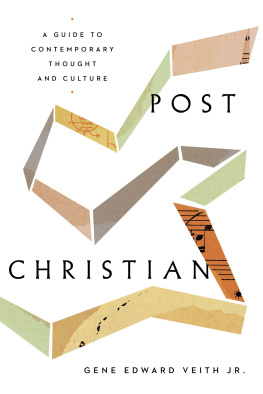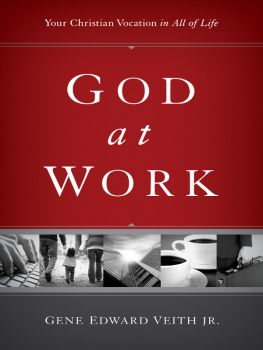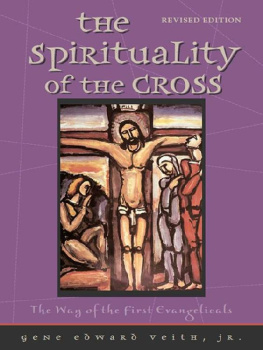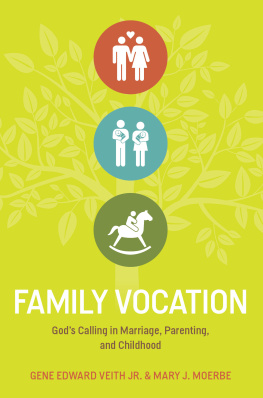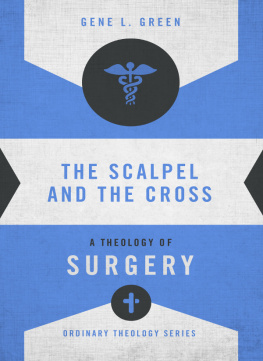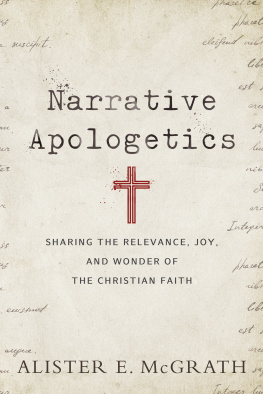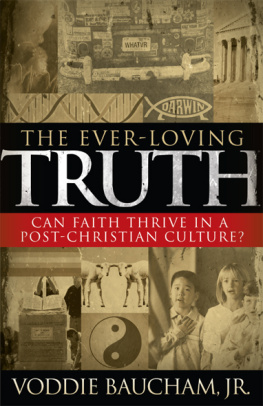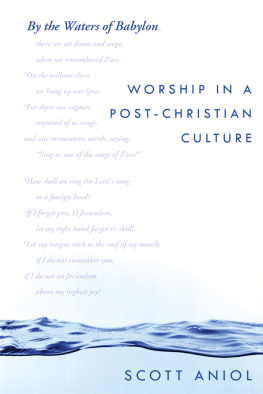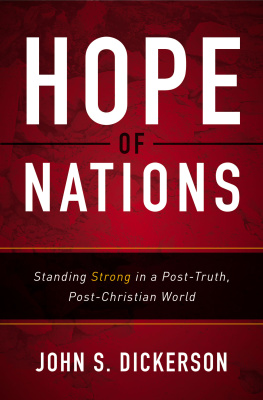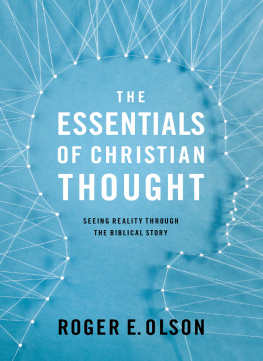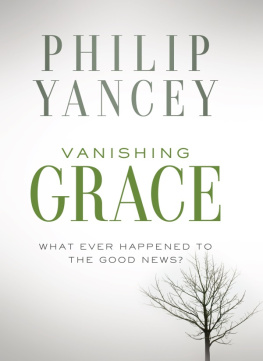Table of Contents
Landmarks
Part 1
Reality
Post-Christian
A Guide to Contemporary Thought and Culture
Gene Edward Veith Jr.
The Story of Kants Neighbor
So the human being stands outside of nature. The modernist imagines the human mind observing, understanding, and exploiting the natural order, thus mastering it. The postmodernist imagines the human mind creating reality, whether by constructing truth or by taking the raw materials of nature and technologically making new realities out of them, thus bending nature to the human will.
Christian critiques often accuse human beings of taking on the role of God. But notice what kind of god we try to make ourselves into. When we take the place of God, we do not emulate the Christian God who cares for his creation, is providentially involved in its every facet, and became incarnate for its redemption. Rather, we try to make ourselves into the god of deism, the impersonal, detached deity of the Enlightenments rational religion that makes and observes. If we are gods, we are watchmaker gods.
The actual deists of the eighteenth century believed that their deity was, in some sense, righteous, overseeing a moral order. But in our role as gods, we are not righteous at all, demanding that reality serve and obey us but doing nothing that brings salvation. Our very attempts to exalt ourselves to the point of taking Gods place disclose how sinful and small we are, as the god we turn ourselves into is pathetic, tyrannical, unloving, and unworthy of worship.
If the modern and postmodern condition is to stand at a distance from nature, what about the environmental movement? Surely environmentalism honors and cares for nature. Indeed, the great popularity of the environmental movement, which has become a de facto religion for many people today, demonstrates the human need to overcome their alienation from the natural order. But notice that by nature, environmentalists tend to mean forests, mountains, and wildlife. Anything human is not natural. To their mind, civilization, with its technologies and economics and communities, is the enemy of nature.
For todays environmentalists, human beings not only stand apart from nature, they can destroy nature. Nature is fragile. Nature is weak. It is at the mercy of Man, whose plastic waste is wiping out wildlife, whose economic rapacity is ruining the landscape, and whose technologies are warming the earth to the point of an upcoming global apocalypse.
I am by no means minimizing environmental concerns, but my point here is that even those most committed to nature cannot help but think of human beings as being separate from the natural order. And, like the modernists and the postmodernists, as being godlike. A god can create the world; and a god can destroy the world.
We human beings need to recover our creatureliness . We must come to realize that for all of our scientific reasoning and our technological creations, we are creatures. We do not create the world, as the constructivists imagine. Nor do we create ourselves, as is the assumption of self-help videos and you-can-be-whatever-you-choose philosophies. Rather, we have been created by a creator other than ourselves, which makes us part of a created order. We are answerable to this created order and must live within its terms. This objective, physical creation is not meaningless, leaving human beings to make up their own subjective meanings, but is rather charged with meaning. But the Creator loves us. He is active in and through his creation, bestowing his gifts and carrying out his saving purposes.
Our civilizations, technologies, and communities are also part of this created order, no less than forests, mountains, and wildlife. As later chapters will show, our current problems with sexuality, our social dysfunctions, and our religious confusions also have to do with losing our sense of creatureliness. This entails going beyond nature to creation. And to embrace creation, we must know the Creator.
One way forward can be seen in a recently rediscovered eighteenth-century thinker who has become something of a sensation in philosophical and theological circles today: J. G. Hamann.
Kants Neighbor
We began this section of the book by discussing the thought of Immanuel Kant, who was simultaneously the pinnacle of Enlightenment rationalism (thus one of the most important modernist thinkers) and the originator of constructivism (laying the groundwork for postmodernism).
Kant had a friend and neighbor in Knigsberg, Prussia, a German city that, because of the fortunes of war, is now Kaliningrad, Russia. His name was Johann Georg Hamann (17301788). The two were part of a circle of bright young men who wholeheartedly and with great enthusiasm embraced the Enlightenment. Kant would summarize the spirit of the Enlightenment with the motto Dare to Know! and the group of friends eagerly cast down traditions and conventional ideas all in the name of Reason.
Hamann was brilliant and well educated, with a particular ability in languages, but he lacked the financial prospects and the sense of purpose of the other Enlightened young gentlemen. Hamann traveled back and forth between Germany and Latvia, trying various professions and trying to find himself. The father of one of the friends, who owned a trading company, took pity on Hamann and hired him to go to London to conduct some business. Hamann botched the assignment, which made him feel humiliated and depressed. He met a bon vivant and lived with him awhile, joining him in a life of debauchery. But then the two fell out, and Hamann moved to a rooming housealmost out of money, owing three hundred pounds, and now in failing health. Dejected, with nothing else to do, he bought a Bible.
Reading the Bible, for Hamann, was overwhelming. The insecure but prideful twenty-eight-year-old felt that God was addressing him personally in his Word. Gods law was demolishing his every pretension, revealing his sins, and bringing him to repentance. And the gospel was revealing Gods grace in Christ, which Hamann described as being even more shocking than the realization of his sin. Hamann described his experience of reading Gods Word:
The further I went, the newer it became for me, the more divine was my experience of its content and effect. I forgot all my books about it; I was even ashamed that I had ever compared them to the book of God, had ever set them side by side, and had ever preferred another book to it. I found the unity of the divine will in the redemption of Jesus Christ, so that all history, all miracles, all the commandments and works of God converge at this central point, in order to lead the human soul out of slavery, bondage, blindness, folly, and death from sin to the greatest happiness, the highest blessedness, and a reception of such good gifts, whose greatness, when they are revealed to us, must shock us more than our own unworthiness or the possibility of making ourselves worthy of them. I recognized my own offenses in the history of the Jewish people; I read the story of my own life.
Thus, when he was reading about Cain killing Abel, whose blood cried out from the ground (Gen. 5), Hamann saw himself in Cain. And Abels blood reminded him of Christs blood. I could no longer hide from God that I was the killer of my brother, the murderer of his only begotten Son.
Despite my great weakness, despite the long resistance which I had, until now, put up against his witness and his tender touch, the Spirit of God kept on revealing to me the mystery of divine love and the benefit of faith in our gracious, only Savior, more and always more.
Hamann was converted:
My son! Give me your heart! [Prov 23:26]Here it is, my God! You demanded it, as blind, hard, rocky, perverse, and stubborn as it was. Purify it, create it anew, and let it become the workshop of your good Spirit. It has deceived me so often, when it was in my own hands, that I no longer wish to acknowledge it as my own. It is a leviathan that you alone can tameby your indwelling let it enjoy peace, comfort, and salvation.

